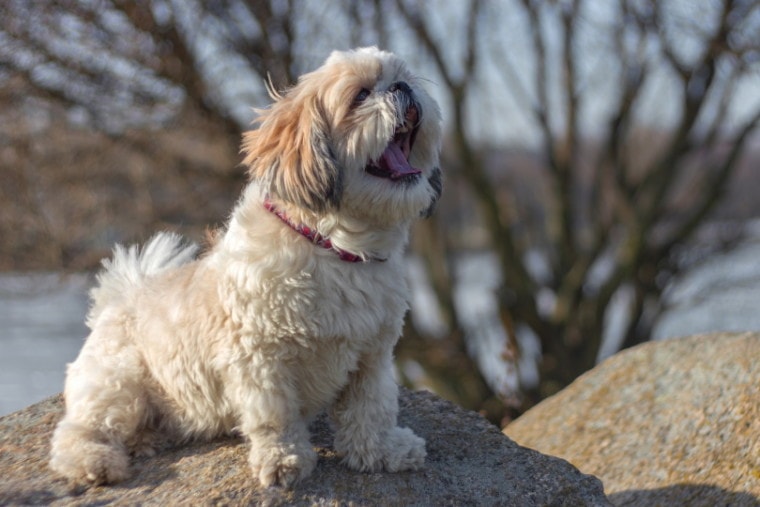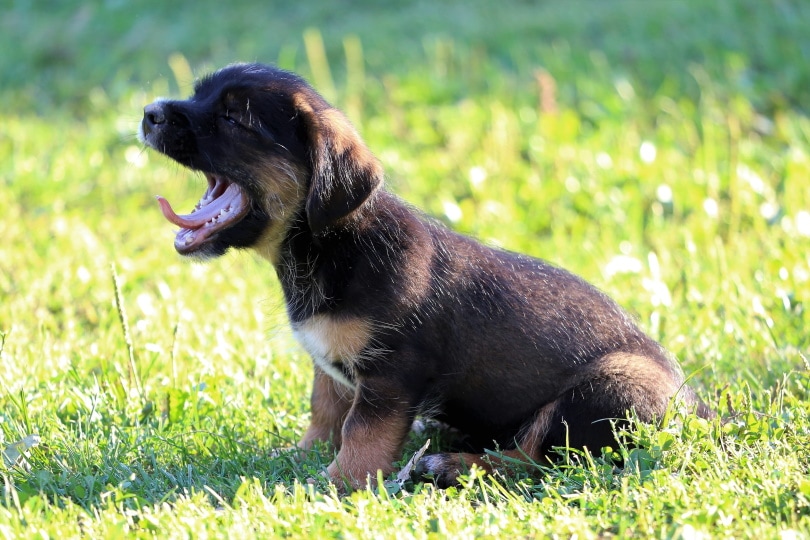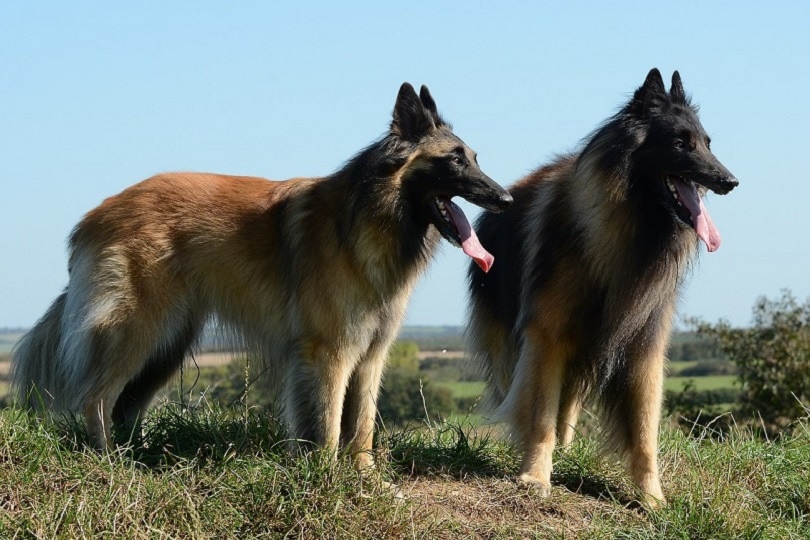
When humans yawn, it is usually a signal that they are either tired or bored. It indicates that their body needs either a fair amount of oxygen or a great rest, which enhances blood flow and helps them remain awake.
However, when it comes to dogs, it is a bit different. Not all yawns are the same. Depending on when and in what circumstance your dog yawns, it could mean several things, some of which are vital to pay attention to as a pet owner.
So, without much fuss, let’s look into the meanings to your pup’s yawn and see what kind of message your dog is trying to tell when they let a gape loose in a car, during training, or right before bed.
What Is a Dog Yawn?
A dog yawn is quite similar between humans and other animals. It is an involuntary reflex where the mouth opens wide, and the lungs take a deep, reflex inhale. Since it is unintentional, there is no way to control the timing of this reflex when it occurs, the amount of air inhaled, and how long it lasts.

The 6 Reasons the Dogs Yawn
Each creature yawns for different reasons, and it is difficult to determine a convincing answer that applies to all. Why dogs might yawn when you pet them or play with them, you might not understand for sure. However, by studying the situation and your dog’s reaction, you can nearly guess what makes them yawn.
Here are some of the reasons why dogs yawn.
1. Stress and Anxiety
Yawning may signal negative emotions such as stress and anxiety. Other forms of nervous body language that often follow this kind of yawning include lip licking, flattened ears, tense muscles, and wide eyes. They are more indications a dog is uncomfortable with the present situation.
To determine whether yawning is due to stress or not, you need to pay attention to when the behavior happens. For instance, if your dog seems to continually yawn when heading to a vet or in a car, it might mean they are yawning due to anxiety or nervousness. However, this might also mean they are excited since dogs tend to yawn when anticipating an activity they enjoy.
If you think your dog is yawning due to stress, it can be good to give them a break. Try to take a break from the current exercise, or even take your dog for a private walk at a dog park. If anxiety was the actual cause of their yawning, it should cease once they calmed down.

2. They Are Excited
Dogs will often yawn when you pet or talk to them. This is not because they are bored with you, but they are just so happy you give them attention.
This might also happen when you are about to take them for a walk or driving to a dog park. They will continuously yawn to show their enthusiasm to play and spend time with you.
If a dog yawns due to excitement, it indicates that they feel delighted and safe. So, there is nothing to be concerned about if your dog yawns when you cuddle its head.
3. To Avoid Conflicts
Your dog is likely to yawn when avoiding disputes or adverse situations.
When meeting with a larger or more violent dog, your pet may yawn to indicate that they do not want trouble. Besides, it is a way to tell the other dog to remain calm and have a tranquil moment together. Yawning while licking the other dog on the snout is a submissive way to say, “I mean no harm to you.”
Furthermore, this is a response a dog can give when they do something wrong and know you would rebuke them for the behavior. Dogs yawn to signal appeasement, indicating their willingness to be obedient and hoping to calm the owner.
When they break a flora or chew on your rug, your dog may yawn to alleviate the tension and try to tell you to relax. So don’t be angry that your pup is disrespectful or ignoring your words by yawning. They are only trying to say to you to take it easy.

4. It’s Contagious
Yawning can be contagious, and it can develop between dogs and humans. Surprisingly, dogs that are more likely to follow a yawn from a human or another dog are better at socializing than those that do not. They display a good bond with others simply by being contagious to yawns.
Contagious yawning makes the relationship between humans and canines look good. Furthermore, it makes the progress of keeping these pets smoother.
5. They Are Tired or Confused
Very much like a human, being tired is the most common reason why dogs yawn. They are probably sleepy after playing and having fun the whole day. However, a tired puppy means a happy pet, so when you see them yawn, you know they had a fantastic moment during the day.
In addition, a dog may yawn when he is confused and does not know what to do next. This mainly occurs during training. You give your dog a command, but the pup is not sure what you want.
The more you repeat a command, the worse the situation becomes. Your dogs’ yawning is not because they are bored with the training or about to fall asleep. They understand you expected them to do something, but they have no idea what it is.
To help get the training session back on track, try to reduce the situation’s pressure and give a command your dog already knows.

6. Communication With Other Dogs
Dogs communicate with each other in various ways, and a calming signal is something they use for the introduction. Yawning is a calming signal. Other signs include licking their nozzle, strolling, and turning their eyes away.
When a dog shows one of these behaviors to another canine, it is their welcoming way. Dogs use calming signals with each other, which are also helpful for interactions with humans. When you approach a new pup, try to yawn at them as a way of saying you are not a threat.
When Yawning Is a Call for Concern?
Yawning is a normal behavior that both humans and dogs show. You can expect an occasional yawn when your puppy is tired, and that should not cause any concern. It is entirely normal for your pup to yawn.
However, some situations should make you worried. If you notice excessive yawning in your dog, it might be an indicator that they need to take a break and calm down. This can be curative for pups with situational anxiety.
Nevertheless, it becomes more challenging when this happens in your home. If you find your pup yawning in fast succession, it might be the right time to check your home for any potential triggers.
Stress in canines can result from a sudden environment change, new pets in the home, or the sudden leave of a loved one. Knowing the source of your pup’s anxiety can help you give your dog comfort. More so, it can help you break off frequent yawning.
If you cannot determine the trigger of their stress, it might be time to consult your vet or a professional trainer for guidance.

Final Thoughts
Yawning is a typical pooch habit that has numerous causes. In most situations, it is not something that you need to be worried about. It is often not directly connected with any health issue, and it can be of more behavioral or social action.
However, if your pups keep yawning and you are concerned about it, call on a professional trainer or vet to spend some time inspecting them and help you identify the cause. This may be an early sign of stress and anxiety, so you should also pay more attention to your pup’s other behavior.
Featured Image Credit: Bilevich Olga, Shutterstock







